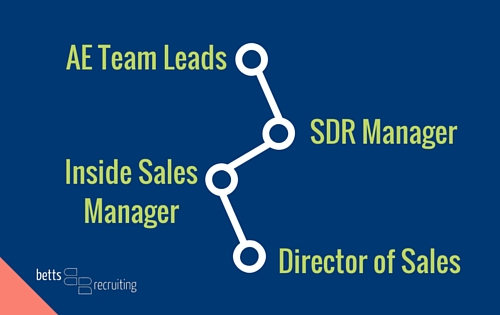Today’s fastest growing companies have sales managers training reps to build revenue pipelines. This post dives into the benefits of building a top-notch SDR team, with an emphasis on the importance of SDR Managers.
In New York’s tech community, we’ve seen a paradigm shift in how high-growth, software-as-a-service (SaaS) companies do cold outreach and inbound prospect qualification. Many successful lead generation teams now have a sales development representative (SDR) manager. This model creates a strong pipeline of internal leaders and helps drive new business faster.
Build Sales Managers Into Your Company Culture
What happens when sales organizations have a bunch of SDR Managers ready for AE management? It guarantees sales leaders with both tactical management and strategic, full-cycle selling experience. Enterprise Reps and Mid-Market AE’s can spend more time selling and less time prospecting, while dedicated SDRs can better use their time qualifying prospects.
Some of Betts’ fastest growing clients adopted the SDR Manager model. We helped Greenhouse, Impact Radius, and Yotpo build out their SDR teams. Now, their normal flow of talent promotion is along the following lines:
Early investment in SDR Management creates a consistent path for leaders to follow. You’ll also create stability for direct revenue gains by incentivizing employees to stay long-term.
Why Sales Teams Need SDR Managers
If you were to ask a Vice President of Sales, “why invest in a lead generation team?” most would say the same answer: more qualified prospects creates more new business opportunities. This is 100% correct, but only half of the payout.
Often overlooked are the added benefits of building an internal pipeline of sales leaders. When expanding to new markets, Inside Sales Managers would move into Director level positions. This trajectory can lead to scaling bottlenecks: Replenishing a high-quality candidate pool for vacant inside sales manager roles is time-consuming.
VPs looking to onboard an SDR Manager must strike the right balance for their business. Pre-Series A companies are generally too small and cash-strapped to justify this investment. Series B and C startups could tolerate a sales manager’s salary. They would see returns in revenue generation, talent retention, and a consistent sales culture.
Another common debate is whether outside talent is more beneficial than internal promotions. Account Executives are often tapped for manager roles, but success rates can vary. They often lack pure leadership experience. Or they’re not quite ready to shift from meeting individual quotas to managing a team. By investing in SDR Management, a VP can rest assured the onboarding process for new hires will inevitably fill the higher rungs of management.
How to Identify Your Next SDR Manager
SDR Managers must create a motivational culture and put in place solid sales fundamentals. Common skills are strategic messaging, consistent follow-up, and detail oriented prospect qualifying. Other important qualities to interview sales managers for include:
-
Consistent Goal Attainment and Overachievement
AE candidates measure the success of indirect revenue gained of individual contributors against their peers. For current SDRs, it’s measured in sales qualified leads (SQLs), revenue generated from meetings, and prospecting methods.
-
Sales Methods
Vet candidates for how they approach sales. What books they have read? What sales philosophies do they practice (spin selling, challenger sales, etc)? The best sales leaders read, and continue to read, about trends in sales. This also demonstrates investment in their career, versus accruing responsibilities for ego purposes.
-
Situational Awareness
Understanding how the candidate reacts when things are not going well, how flexible they can be with uncertainty, and how they adapt to major changes in their normal process is a good way to see if a candidate has the stomach to handle managing a team of junior sales people. Role play or ask for direct examples of challenges faced in past sales environments.
Great SDR managers know how to support their reps day in and day out. They can also pivot to new goals laid out by senior leadership. Senior SDR Managers serve as crucial advisors to the prospect market. They give VPs and Directors valuable insights for remaining agile in competitive markets. When executed well, an SDR team can be the lifeblood of a sales organization. SDR Managers are a critical piece to this puzzle.

